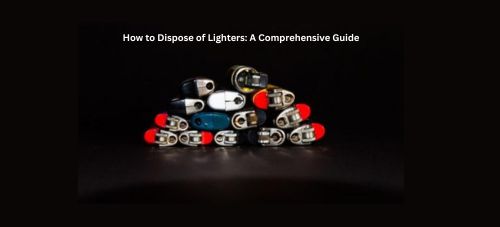How to dispose of lighters uk? Properly disposing of used lighters is crucial for both environmental preservation and safety. In this article, we will explore the professional methods for disposing of different types of lighters, ensuring that you adhere to safety standards and environmental regulations.
Understanding the Types of Lighters
Before delving into the disposal methods, it’s important to identify the type of lighter you are dealing with. There are primarily two types:
- Disposable Lighters: These are typically made of plastic and contain a small amount of butane. Once the fuel is exhausted, they cannot be refilled.
- Refillable Lighters: Often made with metal parts and designed to be refilled and reused. These lighters can last for many years with proper maintenance.
Proper Disposal Steps for Disposable Lighters
Despite their convenience, disposable lighters pose a substantial environmental problem if not discarded correctly. Here are the recommended steps:
- Ensure the Lighter is Empty: Before disposal, make sure that all the butane is used up to minimize the risk of explosion or leakage in waste facilities.
- Do Not Refill: Attempting to refill disposable lighters is unsafe and can lead to accidents, even if it seems there is a way to inject more fuel.
- Contact Local Waste Management: Check with your city or town’s waste management department to see if there are specific guidelines for disposing of lighters. Some places have special programs for hazardous waste.
- Consider General Waste: If no special instructions are provided, it’s often permissible to put empty disposable lighters in general waste. Never put them in recycling bins as they can cause sorting machinery malfunctions.
Proper Disposal Steps for Refillable Lighters
Refillable lighters offer a more sustainable option and require a different approach to disposal:
- Use up or Remove Remaining Fuel: Like disposable ones, ensure all fuel is used up. If the lighter can still function but you no longer need it, consider donating it after emptying the fuel.
- Recycling Options: Check if lighter manufacturers or brands offer a take-back or recycling program. Some brands might refurbish used lighters for resale or recycling.
- Dispose as Hazardous Waste: For completely non-functional lighters, your local hazardous waste disposal facility may be the best option.
The Environmental Impact of Improper Disposal
Lighters are predominantly made of plastic and metals, and when disposed of incorrectly, they can contribute significantly to environmental pollution. Chemicals like butane can seep into the environment, posing risks to water and soil quality and affecting wildlife and human health.
| Environmental Effects of Improper Lighter Disposal | ||
| Effect | Environment | Risks |
|---|---|---|
| Pollution | Water, Soil | Chemical leaching, wildlife harm |
| Waste | Landfills | Non-biodegradable waste accumulation |
| Fire Hazards | Garbage facilities | Explosions, fires |
Conclusion
Correctly disposing of lighters is not only a matter of keeping your home safe but also protecting the broader environment. Whether you are using disposable or refillable lighters, it is important to follow proper disposal protocols to prevent pollution and ensure the safety of waste management professionals.
If you’re unsure about the specifics of lighter disposal in your area, contact local waste management services for guidance. Ensuring that every lighter ends up in the right place is a small but meaningful step toward environmental responsibility.
For more information on waste disposal and recycling, feel free to explore our blog or reach out to us directly. Let’s make each step count towards a cleaner, safer environment!
Ready to dispose of your old lighters safely and responsibly? Contact your local waste management authority today and make a positive impact on the environment!


